New Savannah film 15 Mar 4:00 AM (last month)
We are pleased to be able to share with you a new short film that we have produced. It is only three minutes long but hopefully gives a flavour of the work of Savannah Education Trust.
This is the first of a number of short videos that we hope to produce (the next will be on the Christian aspects of the work).
The post New Savannah film appeared first on Savannah Education Trust.
Online talk recording – March 2025 15 Mar 1:36 AM (last month)
This is a recording of an online talk held in March 2025, providing an update on the work of Savannah.
Thank you for your interest in the work.
The post Online talk recording – March 2025 appeared first on Savannah Education Trust.
Link for Online Talk, 8 March 2025 24 Feb 11:36 AM (last month)
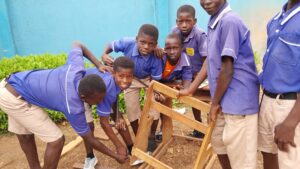
We hope to hold an online talk on Saturday 8 March at 7.30 pm (UK time). This is an opportunity, if the Lord will, for us to update you on developments in Ghana and outline the future plans for the work.
Please save the date and join the meeting using the link below:
https://us06web.zoom.us/j/
If you have any questions in the meantime, please do feel free to contact us.
The post Link for Online Talk, 8 March 2025 appeared first on Savannah Education Trust.
Newsletter, December 2024 24 Dec 2024 6:19 AM (3 months ago)
Welcome to our December 2023 newsletter
Savannah Education Trust is a charity providing an education for some of the poorest children in West Africa. We now have ten Christian schools in northern Ghana in the villages of Bagri, Gberi, Korh, Pavuu, Mettoh, Tungan-Zagkpee, Boo, Baapari, Danko-Buree and Lyssah. The charity also ensures every schoolchild receives a meal each day and has a programme to support teachers in this remote and poor area.
Dear Supporters,
There is something unforgettable about the first visit to a Savannah school: driving through the green landscape, seeing the first glimpse of the blue walls and hearing the first happy sound of children’s voices.
When some of our trustees visited Ghana for the first time, they were struck by something else too – the dedication and enthusiasm of the students. At Bagri Primary School, the first school built by Savannah, we arrived in the middle of a national teacher strike. Despite this, the children had come into school to revise for their end of year exams coming up later in the week.
Even more striking than the wish to be in school was a group of boys, under the shadow of the eaves, repairing a broken classroom desk. Their care for their school was obvious. They were spending their spare moments in maintenance work, Sammy, who is 12, was asked what he wanted to be when he grew up. Before the school was built, his answer would have been predictable: the hard slog of a life of subsistence farming. But his eyes lit up as he said, “a carpenter – so I can build schools.”

At this time of year, we particularly remember the coming of the Lord Jesus who humbled himself to such an extent that the people dismissively asked, “Is not this the carpenter?” (Mark 6:3). But we also take a moment at the end of the year to reflect on all that has happened to the charity to the year: the hundreds of lessons taught and the thousands of meals served. And we think of children like Sammy who are now benefitting from a school. They have the opportunity to dream: whether, as in Sammy’s case, of running a small carpentry business or, like other children at Bagri, becoming medics and teachers, mechanics and entrepreneurs. Now they also have a greater blessing than decent education and future dreams: the hope of the gospel.
Those children gathered in the eaves of Bagri School are not able to thank you personally. It is our greatest privilege to be able to do so on their behalf. When we look at these children and their bright hopes for the future, we know that none of it would be possible without our supporters.
We shared in our most recent newsletter, that our needs are greater than ever and our finances more challenging than at any stage in our two-decade history. Your support is very precious to us.
We join with all of our friends in Ghana in wishing you a very happy Christmas and God’s blessing during 2025.
On behalf of the trustees, and with our thanks,

Paul Ramsbottom
The post Newsletter, December 2024 appeared first on Savannah Education Trust.
Newsletter, Autumn 2024 16 Sep 2024 11:02 AM (7 months ago)
Welcome to our September 2024 Newsletter
Savannah Education Trust is a charity providing an education for some of the poorest children in West Africa. We now have ten Christian schools in remote villages in northern Ghana: Bagri, Gberi, Korh, Pavuu, Mettoh, Tungan-Zagkpee, Boo, Baapari, Danko-Buree and Lyssah. The charity also ensures every schoolchild receives a meal each day and has a programme of supporting teachers in this remote and poor area.
Opening of Lyssah School
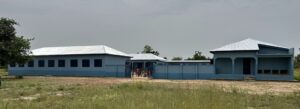
During a recent visit to Ghana, trustees attended the commissioning of the new Savannah school at Lyssah. This is the tenth village in which we are working and, because of its remote position, has been logistically the most difficult school for the Savannah team to build.
Although Lyssah is one of the district’s largest villages, the new school is the furthest from our base in the market town of Lawra (over ten miles away). For the commissioning ceremony, local dignitaries and trustees took the bumpy track out to this remote village. The route runs north-east along copper red tracks. Scattered homesteads with straw thatched roofs peep through the landscape.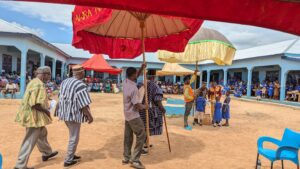
Bumpy though it may have been, it was a journey worth taking – and not just for the scenery. The overwhelming emotions at the opening ceremonies for Savannah schools are joy and gratitude: joy that – for the first time – children can experience all the benefits of a Christian education. Without that education, the future for the children gathered in the shadows of our bright blue school building at Lyssah would be extremely difficult. In this remote community, there are few opportunities without education other than the grinding challenges of subsistence farming.
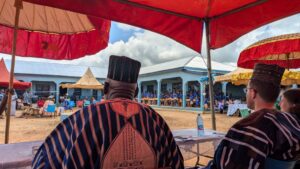 The school commissioning ceremony at Lyssah – a long three hours in the hot sun – was therefore largely an expression of gratitude from this rural community. It was a thanksgiving seen in the welcome received on arrival (villagers dancing and singing as guests entered through the school gates) and heard in the many speeches. The Paramount Chief described the work of Savannah as the ‘single most important development of his paramountcy’, and the local village chiefs and representatives from the Ghanaian Education Service also spoke warmly of the effect of Savannah.
The school commissioning ceremony at Lyssah – a long three hours in the hot sun – was therefore largely an expression of gratitude from this rural community. It was a thanksgiving seen in the welcome received on arrival (villagers dancing and singing as guests entered through the school gates) and heard in the many speeches. The Paramount Chief described the work of Savannah as the ‘single most important development of his paramountcy’, and the local village chiefs and representatives from the Ghanaian Education Service also spoke warmly of the effect of Savannah.
Supporters would, however, surely have been most touched to hear a poem recited by the children with the refrain:
When we see what Savannah have done,
They have done so much for us.
We have nothing more to say,
Than we say: God bless them all.
To arrive now in Lyssah early in the day is very exciting. Across the savannah in all directions, you can see these young children – in their blue uniforms – snaking through the savannah landscape to their new school. We join with the community at Lyssah in expressing our thanks for the support that allowed this school to exist.
All change
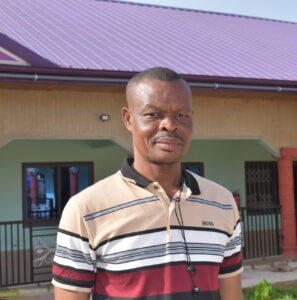
As noted in our previous newsletter, there was a change of leadership in Ghana at the start of the year. Our longstanding Country Director, Charles Karbo (‘Pastor Charles’ as he is universally known), has retired and moved into an honorary role. We are very thankful that the transition to the new Country Director, Alfred Sogsuo – ably supported by his senior team – has been smooth (although his first six months in post have been relentlessly busy). “God is leading” was Alfred’s comment on those first six months.
In the UK, we are pleased to have added two trustees to support the expanding work: Helen Skelton (a teacher and Head of Science at a successful secondary school) and Matthew Roe (currently undertaking postgraduate research at Oxford). They write of their experiences visiting Ghana in the next article.
There are more introductions to some of the key people involved in Savannah (both in Ghana and the UK) on our website: https://www.savannaheducationtrust.org/about/
Fresh eyes
This remote and beautiful part of the world, and the profound impact of Savannah on the people who live there, is never forgotten by those who visit. Our two new trustees were part of a small group travelling to northern Ghana in July. They describe their first impressions.
We arrived in Ghana at the start of the rainy season, with the savannah covered by the vibrant green of young grass, interspersed with fields of newly-planted crops. 90% of those in the Lawra District, and almost all the families in the villages where Savannah schools are based, are subsistence farmers – living off what they are able to produce from the land. With the coming of the rain, they work in the fields from sunrise to sunset to dig, plant and weed their fields by hand – an exhausting task in hot, humid conditions which requires the effort of all those in the household, from the youngest to the oldest. In the midst of these fields emerge the vivid blue walls of the Savannah schools, where thousands of children are given the hope which comes with an education.
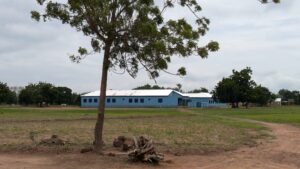
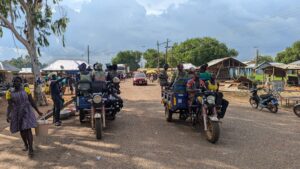
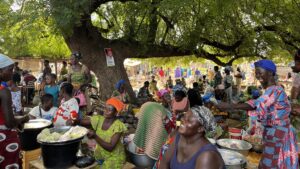
Our initial impressions were of the colourful sights and sounds of the town and villages, the open friendliness of the Ghanaian people, and those glimpses of blue in the beautiful savannah landscape. As the week went on, we were struck by two things: contrasts and gratitude. Contrasts within and between the lives of those living in this remote region of Northern Ghana – and contrasts with our comfortable lives back home. Gratitude from so many for all that Savannah has done.
Early in the week, we visited Bagri Primary School – the first school built by Savannah. Despite the national teacher strike happening that day, the children had come to school, revising for their end-of-year exams coming up later in the week.
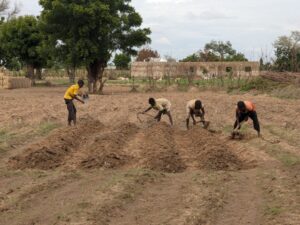 Having seen happy, lively, flourishing children at Bagri, it was hard to see the contrast between them and the many children labouring in the fields as we drove around. This really highlighted the importance of the school feeding programmes in enabling children to be in school. The Savannah team emphasised the contrast between Savannah schools – where children are fed – and other schools where they are not: differences seen in children’s attendance and ability to learn. Over the past few years the Ghanaian government has been helping to support the feeding programme. A combination of increasing pupil numbers, alongside the strains on the government funding, means that we will need to spend significantly more on our feeding programme from the start of the next academic year.
Having seen happy, lively, flourishing children at Bagri, it was hard to see the contrast between them and the many children labouring in the fields as we drove around. This really highlighted the importance of the school feeding programmes in enabling children to be in school. The Savannah team emphasised the contrast between Savannah schools – where children are fed – and other schools where they are not: differences seen in children’s attendance and ability to learn. Over the past few years the Ghanaian government has been helping to support the feeding programme. A combination of increasing pupil numbers, alongside the strains on the government funding, means that we will need to spend significantly more on our feeding programme from the start of the next academic year.
Perhaps above all, we were struck by the overwhelming sense of gratitude from the Ghanaian people, people who have so little compared with us. Wherever we went, it was striking how sincerely people expressed their gratitude for the work of Savannah, work that has only been possible through your generous support. To mention just two examples:
- As we visited each of the schools and spoke with teachers, consistently they spoke of their gratitude for the schools, the opportunity they have of teaching in them, and the benefits the schools have brought to the children and communities.
- The Savannah team in Ghana spent the week taking us around the schools and answering our many questions about the work and the culture. So often during the week they spoke of the difference Savannah was making and expressed their gratitude for your generosity in supporting the work, and to God to whom they wish to give all the glory.
________________________________________________________________________________________________
A spiritual work
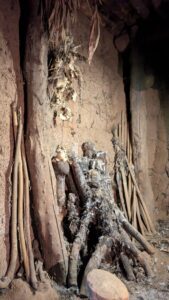
When visiting the region, the transformative impact of Savannah schools is evident. But there is also a spiritual dimension to this. Within Lawra District, it is estimated that 80-90% of people practice traditional ancestor worship.
One evening during the recent visit we went to a traditional house next to Tungan-Zagkpee school, where we saw the family’s idols – carved figurines representing their ancestors placed in the corner of a room, to which the head of household will sacrifice animals in times of need. Many households remain trapped by a fear of local witch doctors, their curses and voodoo practices.
In this home we also met two children, one wearing a Savannah uniform.
Having come away from our evening visit, deeply shocked by what we had seen, it was a real joy the next morning to visit the neighbouring school to find the students (including these two) sat outside under a huge baobab tree, where a local pastor was opening up the Word of God to them in assembly. As part of the Christian ethos of the Savannah schools, the students hear an assembly from a local pastor every week, as well as receiving their own Bible upon leaving primary school.
The contrast between spiritual darkness and light in the lives of these children could not have been starker.
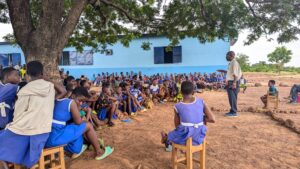
The Savannah schools give significant indirect support to the local churches (many of whose members have been converted out of idol worship), by making the gospel known to the children of the area in addition to employing many local church members and allowing the local church fellowships to use the schools for their Sunday services.
________________________________________________________________________________________________
A teacher’s perspective
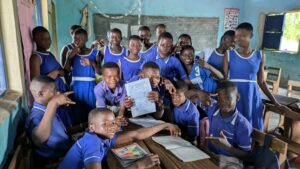
As a teacher, I was particularly interested to visit the schools, speak with the children and see what they were learning. As I looked through their exercise books and spoke with them it was fascinating to see the same knowledge being taught in these remote schools, in simple classrooms furnished only with wooden desks and a whiteboard, as I would teach in a modern, well equipped school laboratory! But the contrast with home that really struck me was the motivation of the students, who clearly value the privilege they have of being able to go to school and learn. Many of them spoke of how they want to learn so that they can become teachers, nurses or police officers – aspirations most of their parents, living through the hard-graft of subsistence farming, would never have imagined.
________________________________________________________________________________________________
The building work continues …
Teachers’ accommodation
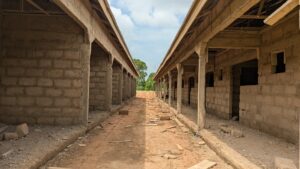
We are very grateful to all who have contributed to our 20th anniversary project: building of teachers’ accommodation. We are glad to report that the accommodation at our school in Boo is nearing completion, and will soon be available for teachers. This is a very important project for Boo: acting as a significant incentive to attract teachers to this remote area. As funds allow, we hope to construct accommodation at other Savannah schools – prioritising those in the most remote locations.
Technical High School
In our last newsletter we mentioned our plans to build what is known as a ‘Technical High School.’ This is with the prayerful ambition of fulfilling the great need for vocational training in this area, i.e. to help children who leave school at 14 to develop a skill or craft and perhaps eventually set up a small business.
We value your prayers for this complicated project. Obtaining land in the villages for our schools is usually relatively straightforward – it is gifted to us by the community. However, land ownership in the town is more challenging and generally requires negotiation with multiple stakeholders. We continue to look at possible plots on the edge of the market town of Lawra for to site the Technical High School.
A new Junior High School (JHS) at Danko-Buree
The building work to create a JHS or ‘secondary school’ (in UK terms) is nearly complete. It is hoped that it will be finished in time for the new term starting in September.
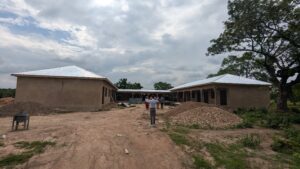
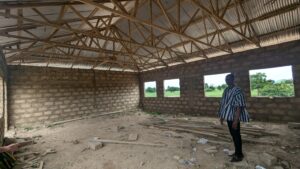
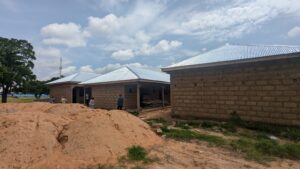
Renovation work
Renovation work is, of course, never truly finished. Nonetheless, over the past 18 months all Savannah schools have been repainted (bright blue, of course). We have always wanted the schools to both look and act like beacons, and with their fresh and tidy feel this is exactly how they now appear.
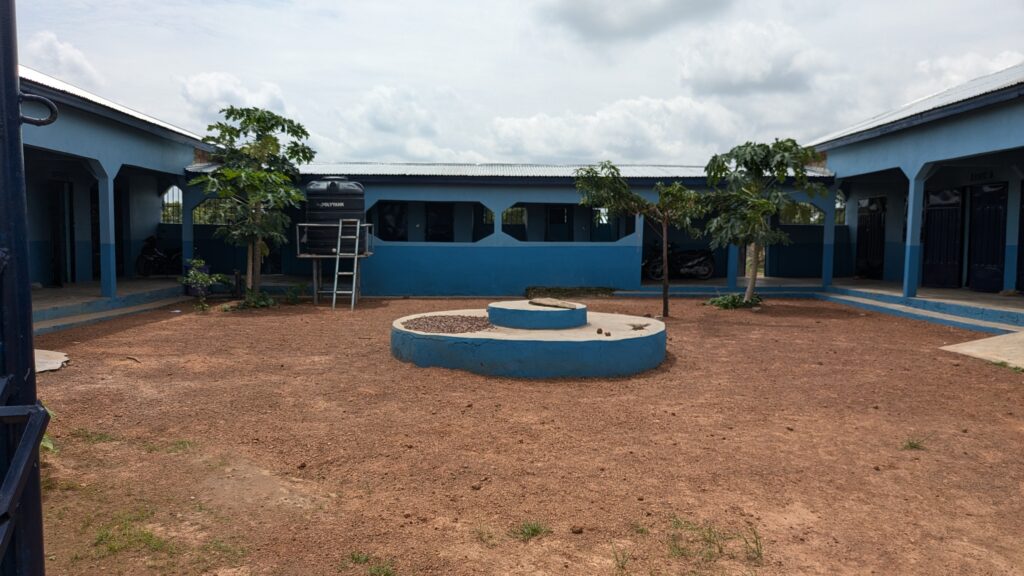
Among other improvements, schools have also been fitted with a raised water storage tank allowing for flowing water in their toilet facilities.
Online presentation
In January, we held a Zoom meeting to provide an illustrated update on the work in Ghana. This was also an opportunity for supporters to ask questions about the work. The recording of the presentation is available on our website. We hope that it is suitable to share with anyone who would like an introduction to Savannah.
https://www.savannaheducationtrust.org/2024/01/online-talk/
Thank you
As is always the case, a newsletter can only give the smallest flavour of the work in Ghana.
Nothing would be possible without your generous donations. Month by month our costs increase. The sheer range and scale of the work can be daunting. That is especially true now as the deficit between our anticipated income and our outgoings each month is higher than it has ever been.
One of the things that struck our new trustees when they visited Ghana was just how much the support of Savannah is valued by the communities we serve. We echo our friends in Ghana in thanking you for your support and for your prayers.
The post Newsletter, Autumn 2024 appeared first on Savannah Education Trust.
Online Talk Recording – January 2024 11 Jan 2024 12:40 PM (last year)
On Saturday 27 January 2024 we held an online talk to provide an update on the work. You can watch a recording of the talk above.
In the talk we reference our short film ‘Children of the Savannah’ which can be watched here.
Thank you for your interest in the work.
The post Online Talk Recording – January 2024 appeared first on Savannah Education Trust.
Newsletter, December 2023 16 Dec 2023 2:05 PM (last year)
Welcome to our December 2023 newsletter
Savannah Education Trust is a charity providing an education for some of the poorest children in West Africa. We now have ten Christian schools in northern Ghana in the villages of Bagri, Gberi, Korh, Pavuu, Mettoh, Tungan-Zagkpee, Boo, Baapari, Danko-Buree and Lyssah. The charity also ensures every schoolchild receives a meal each day and has a programme to support teachers in this remote and poor area.
- A time of change
- What next?
- Technical High School
- Painting, all year round…
- Trees at Mettoh
- Zoom meeting
- Thank you
A time of change
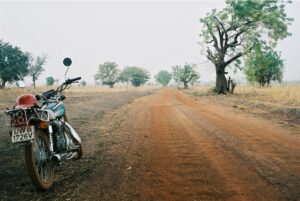
Let us take you back two decades. If you were travelling along the dusty tracks around the market town of Lawra in northern Ghana you would see no Savannah schools. But you might encounter a man on a battered blue motorbike bouncing towards you. The clue to both the man and his mission is revealed by a closer look – because under his left arm, as he drives, is an equally battered book: a Bible.
The man was Charles Karbo. Under the Lord’s leading, he had a great concern for the remote rural villages in this area of northern Ghana. And, as he travelled on his bike to preach in the remote villages, he also had a concern that the children of the villages might have an education.
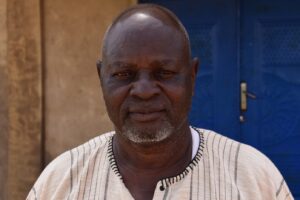 The Lord answered that prayer through Savannah Education Trust. “Pastor Charles” (as he is universally known) became a pastor of one of the village churches in Bagri and also the Country Manager for Savannah. “Country Manager”, of course, would have sounded rather grand in the early days – but by 2023 we are working across ten villages, with over 150 teaching staff and several thousand pupils.
The Lord answered that prayer through Savannah Education Trust. “Pastor Charles” (as he is universally known) became a pastor of one of the village churches in Bagri and also the Country Manager for Savannah. “Country Manager”, of course, would have sounded rather grand in the early days – but by 2023 we are working across ten villages, with over 150 teaching staff and several thousand pupils.
Pastor Charles will retire from his work at Savannah at the end of the year. He will continue to support the work in an honorary role. We acknowledge all that he has done, and no doubt our supporters echo this thanks.
In September, trustees joined staff in Lawra to honour and thank Pastor Charles. Among other gifts, he was presented with an illuminated address reading:
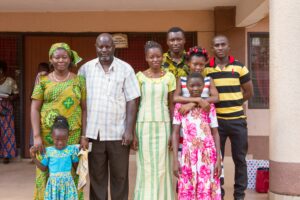 On the occasion of your retirement and with immense gratitude for all that you have contributed to the work of Savannah Education Trust. You have been involved with the work from the earliest days and have led and shaped it with great skill and dedication. “Your labour is not in vain in the Lord” (1 Corinthians 15:58).
On the occasion of your retirement and with immense gratitude for all that you have contributed to the work of Savannah Education Trust. You have been involved with the work from the earliest days and have led and shaped it with great skill and dedication. “Your labour is not in vain in the Lord” (1 Corinthians 15:58).
Your friends and colleagues join to thank you and to wish you the Lord’s blessing. We stand amazed at all that has happened with a network of Christian schools across Lawra Municipality and many hundreds of pupils. We join with you in saying, “To God be the glory – great things He has done.”
What next?
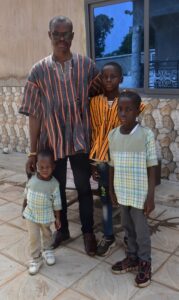
Throughout the year, the trustees have been prayerfully considering the way forward. An open recruitment process was held, allowing for any candidate to submit an application. We are thankful to announce the appointment of Alfred Sogsuo as Country Manager (in the first instance for a three year period). Alfred is a native of Bagri, and has been with us since the earliest days. He has trained as an accountant whilst working for Savannah and is currently Assistant Country Manager & Accountant. A man of great energy and entrepreneurial spirit, he has many outside roles including board member of a vocational institute in nearby Nandom and vice chair of the Inter Party Dialogue Committee for the area. Most importantly, he is a leader in the local Baptist church and a man of prayer.
He says, “I am very grateful to God for entrusting the leadership into my hand. I promise that I will do my best in the Savannah operation with your prayerful support.”
Alfred takes up his new role at the start of January. We know that both Alfred and Charles would appreciate your prayer at this moment of transition.
Technical High School
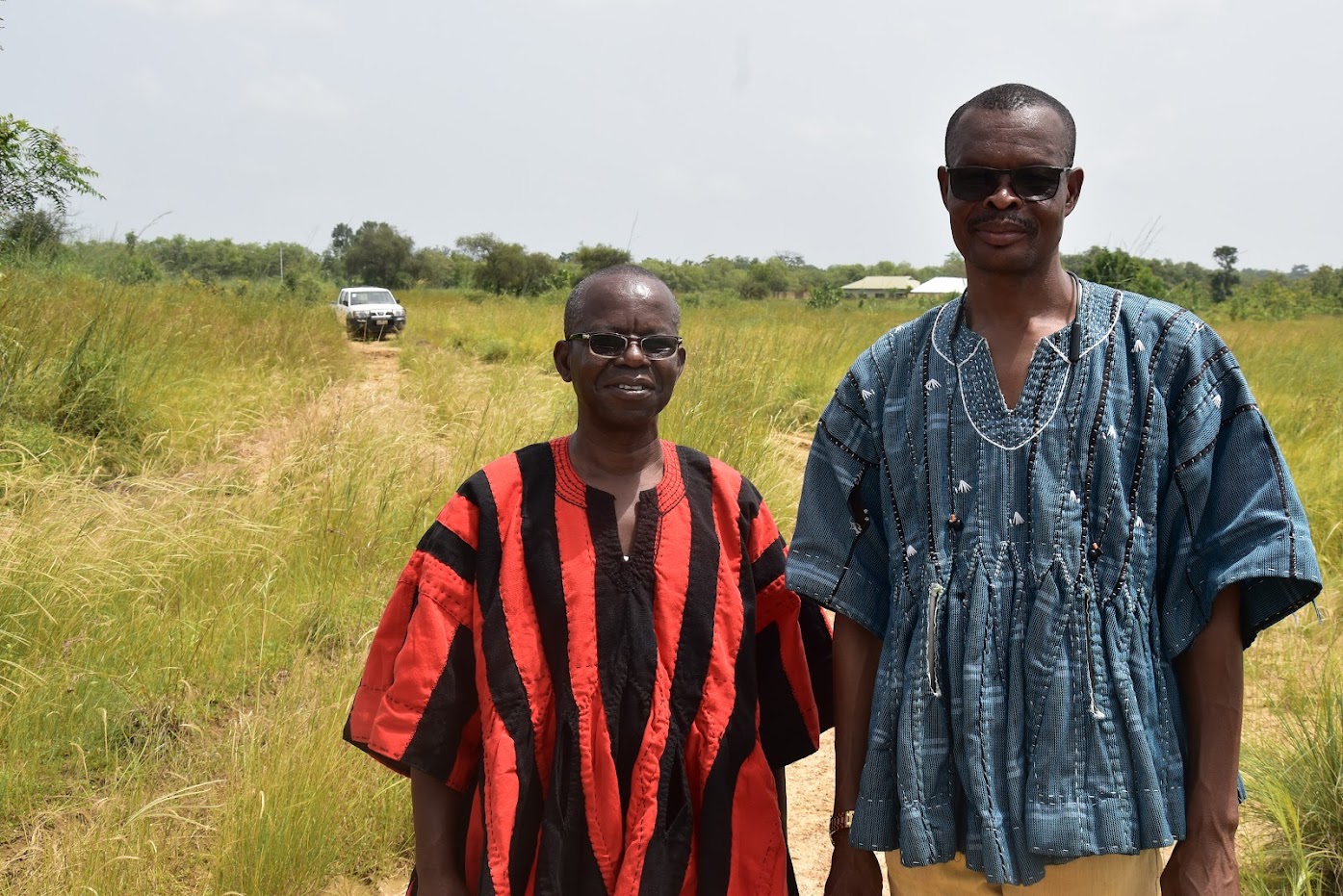
Across nearly 20 years of public presentations, probably the most regular question we have been asked is ‘what happens to children when they finish school?’ The answer that we have given has remained consistent: that an education in these villages is not primarily about job opportunities – but improvement to the quality of life: from farming improvements to learning simple hygiene lessons. We can point, for example, to the evidence that education produces an improvement in farming and a reduction in children dying. And we can also speak of the moral and spiritual value of a Christian education.
Nonetheless, many of the children in our rural schools have gone on to further education and training (often with the help of Savannah). For a long time, the team in Ghana have felt that there is a real need for vocational training – to help children who leave school at 14 who wish to develop a skill or craft, and perhaps eventually set up a small business.
We are therefore hoping, if the Lord will, to build what is known as a ‘Technical High School’ and have identified a plot of land just north of the market town of Lawra. The intention is to start relatively small with practical skills such as construction, carpentry and electrical skills. The local government are supportive of the venture. We are thankful to have received a kind donation to start the project. We are grateful for your prayers as we start on what is a major new initiative for us.
Painting, all year round…
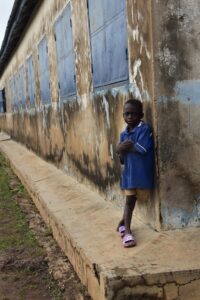 In our newsletters we often show photographs of the new schools that have just been built. They always look pristine, glowing with fresh paint in the Savannah two-tone blue.
In our newsletters we often show photographs of the new schools that have just been built. They always look pristine, glowing with fresh paint in the Savannah two-tone blue.
During recent visits we were reminded that, in reality, it doesn’t take many years before the harsh African climate takes its toll on the appearance of any Savannah school.
The constant heat, the intensely heavy rains, and the very strong winds mean that the team in Ghana have had to institute a programme of painting to keep the schools looking good, and to ensure they have the layer of protection that the paint provides.
The Ghana team are currently testing out a new batch of paint which they hope will last much longer than the paint previously used. Prior to painting, the school is reviewed to ensure that any other building maintenance – such as re-plastering – is carried out. With schools now in ten villages, there is a constant cycle of painting, so that as soon as one school is finished the painters move on to the next.
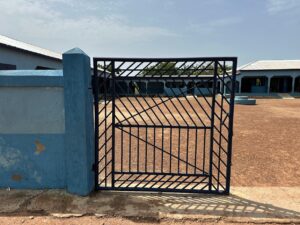
To illustrate the extremes of the climate, we could point towards the school entrance gates. For the first few Savannah schools we purchased attractive solid metal gates, but within a few years these had all been destroyed – twisted and blown off their hinges by the strong winds.
Now we use an open gate design which the wind can pass through, whilst still keeping the schools secure. So far these have survived unscathed …
As more schools are built an ever-increasing proportion of our funds is required for the ongoing but essential maintenance of the school buildings. We are very thankful for the provision of the funds to make this possible.
Trees at Mettoh
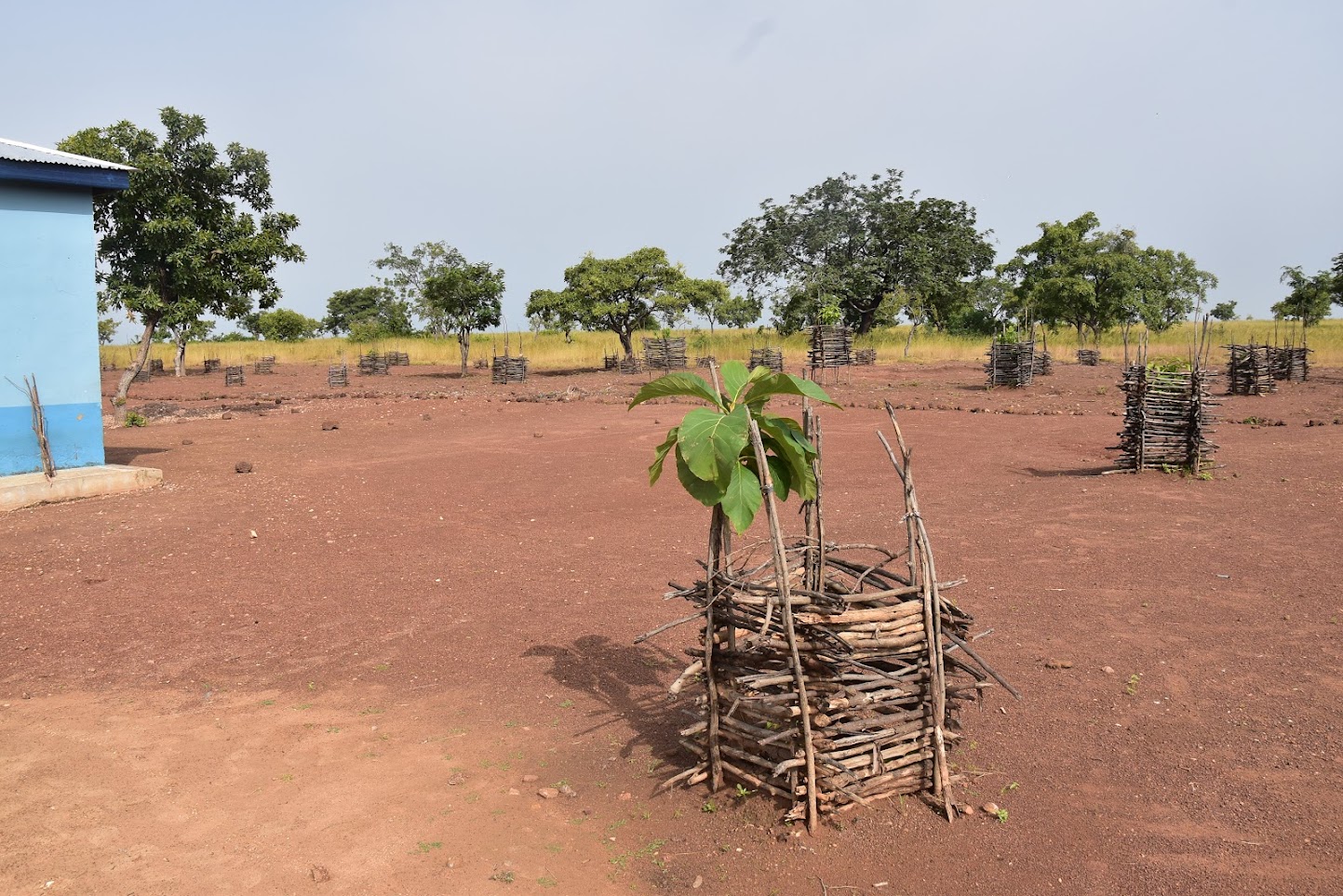
At Mettoh school numerous trees – including mango, acacia, teak and mahogany, have been planted around the school. Each child has been given a tree and it is their responsibility to nurture it – building a protective frame around it and watering it during the dry season. Some pupils even come back in the holidays to care for their tree.
Zoom meeting
If the Lord will, we hope to hold a webinar to provide an update on the work on Saturday 27 January 2024 at 7.30pm. We hope that as many of our supporters as possible will join the meeting. Zoom details will be circulated by email (please sign up for email updates if you have not already) and will also be available on our website.
Thank you
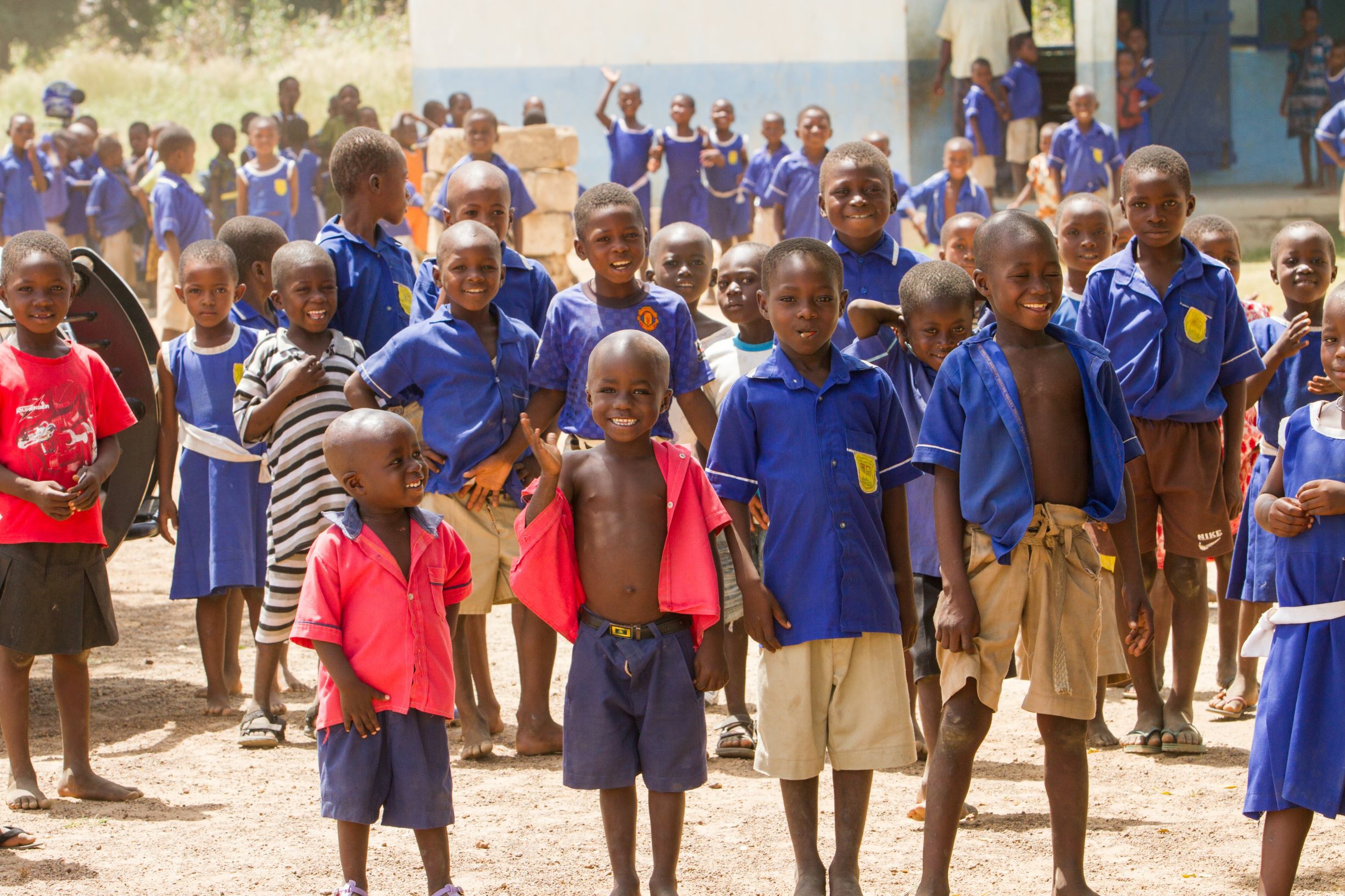
There is so much happening across the Savannah schools. This newsletter can only reflect on a few of the activities. Despite the sheer scale of the work in Ghana, we have managed up until now with no paid staff in the UK and no formal ‘fundraising’.
Nothing would be possible without the generous donations of our kind supporters and, as we come to the end of the year, we want to thank you for your ongoing direct debits, one-off contributions and legacies. This is particularly important at a time when our costs in Ghana continue to rise.
We join our friends in Ghana in thanking you for your support, and wishing you God’s blessing for the new year. At this time of change, we are grateful for your loyalty and need your support more than ever.
The post Newsletter, December 2023 appeared first on Savannah Education Trust.
Newsletter, December 2022 12 Dec 2022 11:45 AM (2 years ago)
Dear Supporters,
We often wish that we could take you each to the savannah land of northern Ghana, and to show the effect of the work that you are supporting.
It can be seen in the bright blue buildings that you can see scattered through the countryside – Christian schools now spreading hope across ten different villages. It can be traced out through the statistics: several thousand pupils enjoying an education across hundreds of square miles; several hundred teachers benefiting from employment; several dozen individuals currently undertaking teacher training with the help of our scholarships.
Above all, no doubt, you would see the impact of Savannah through the individual lives touched, and the individual lives changed. And so over the years – unable to transport you to this remote part of Africa – we have tried each Christmas letter to relate the story of one individual.
It is hard to believe that this is our 18th such letter. On a recent visit to Ghana, we met two of the children who have featured across the years. We thought that you might find their stories encouraging.
The first meeting was unexpected. We happened to be in Ghana for the sitting of the national examinations (equivalent of British GCSEs) in October. In the market town of Lawra, hundreds of children from schools across the area congregated outside exam halls. Among the many nervous pupils, we found it strangely moving to catch glimpses of “our” children – all smartly dressed in bright blue. And there, among them, was a familiar face. Pedalling up the dirt track was Beri Banguu. He parked his wheelchair bike outside the exam room, and was able to clamber up the few steps to sit his papers. It was the happiest of reunions, and as he later set off to cycle back to his village, he told us that the exam seemed to go well.
Beri’s story is told in a short video on our website. He lives in Gberi village and has been severely disabled from birth. Once he spent his days crawling in the dirt — with little hope for the future. Then one day some Savannah workers came to his house. Beri had seen a blue school being built, just close to his house. But he had not dared to hope that the school was for him, as well as for all of the other children.
Now, with the help of the Christian education provided by our school in Gberi – and with an adapted wheelchair provided by Savannah – his live is very different. He is independent, travelling on his own from his village to Lawra. And he is able to join the other children in taking his school exams.

Daafah Pagyel is older than Beri. He is from Bagri and was part of that first generation of children thrilled to witness the opening of the blue Christian school in 2006: our very first village school. At first glance, unlike Beri, he seems just like every other child. But his world is entirely silent; indeed he has known nothing but silence as he was born profoundly deaf. To make his early life even more difficult, his father died when he was a toddler.
It is hard to describe the thrill of that first ever generation to attend school. Yet it was less thrilling for Daafah, and it soon became clear that he would need further help. Through support from Savannah he was able to attend a specialist school in the regional capital, Wa (staying with a Baptist deacon and his family while away from home).
It is strange to think that children like Daafah, who we met on our first visits and who helped to inspire the work of Savannah, are no longer toddlers but are in their 20s. Daafah, having successfully completed his education and some vocational training, is now working as a mason – helping with construction projects across the area. Indeed he has teamed up with a number of his fellow pupils to form a band of deaf masons who travel around following the work together.

It has been another busy year for the charity. As we look to the future, we think about those many children, following after Beri and Daafah, who continue to be helped by Savannah – and those who have not yet known this benefit. We are ever more dependent on your support as the work expands. We are also ever more dependent on prayer that the Lord would continue to bless the work for both the physical and spiritual benefit of these remote communities.
Beri and Daafah are not able to thank you personally. We count it an immense privilege to do so on their behalf. We are thankful and excited by all that has happened. It is the Lord’s doing and it is marvellous in our eyes (Psalm 118). Please be assured that your support is greatly valued and is going directly to help another generation of children like Beri and Daafah.
We join with all of our friends in Ghana in wishing you a very happy Christmas and God’s blessing during 2023.
On behalf of the trustees, and with our thanks,

Paul Ramsbottom
The post Newsletter, December 2022 appeared first on Savannah Education Trust.
Newsletter, Autumn 2022 27 Sep 2022 1:00 AM (2 years ago)
Welcome to our Autumn 2022 newsletter
The Savannah Education Trust is a charity set up to provide an education for some of the poorest children in West Africa. We now have nine Christian schools in northern Ghana in the villages of Bagri, Gberi, Korh, Pavuu, Mettoh, Tungan- Zagkpee, Boo, Baapari and Danko-Burree. The charity also ensures every schoolchild receives a meal each day and funds a number of teacher training scholarships to attract teachers to this remote and poor area.
- Building, Building, Building
- Teacher Training & Conference Centre
- On the Road Again
- The Opening of Danko-Buree
- Lives Changed
- Thank You
You can also download a PDF version of this newsletter.
Building, Building, Building
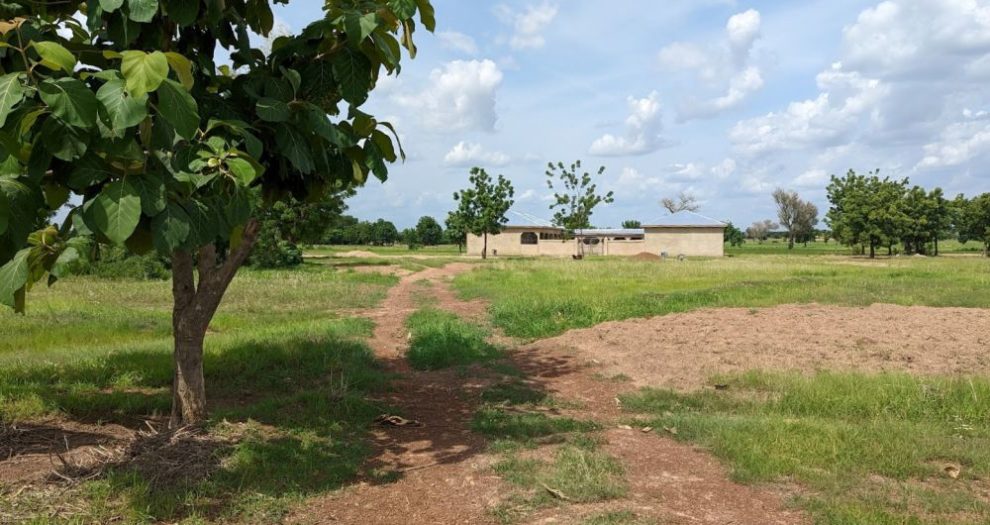
Around the savannah countryside and in the market town of Lawra, a number of important building projects are reaching completion: the fruit of much hard work and the generosity of kind supporters.
A new school, shown in the photo above, is emerging from the savannah in the village of Lyssah. As mentioned in our last newsletter, Lyssah is one of the district’s largest villages – and this will be the most northerly of our schools. Most of the work on site has happened this calendar year. The work was slowed somewhat by difficult weather: heavy rains which made access for our heavy vehicles challenging along the dirt roads and a storm which caused some damage to the building. Nonetheless at the time of writing, our tenth school was virtually finished … and ready for pupils to arrive and be taught.
At the village of Baapari, a new secondary school (for children aged 11-14) has been constructed. This will allow the village children who attend our school at Baapari to continue in education up until the age that they take the national exam in Ghana: the Basic Education Certificate Examination. The exam – which is needed to continue with any further education – includes a range of subjects including English, Mathematics, Integrated Science, Religious and Moral Education, a local Ghanaian language and Information Communication & Technology.
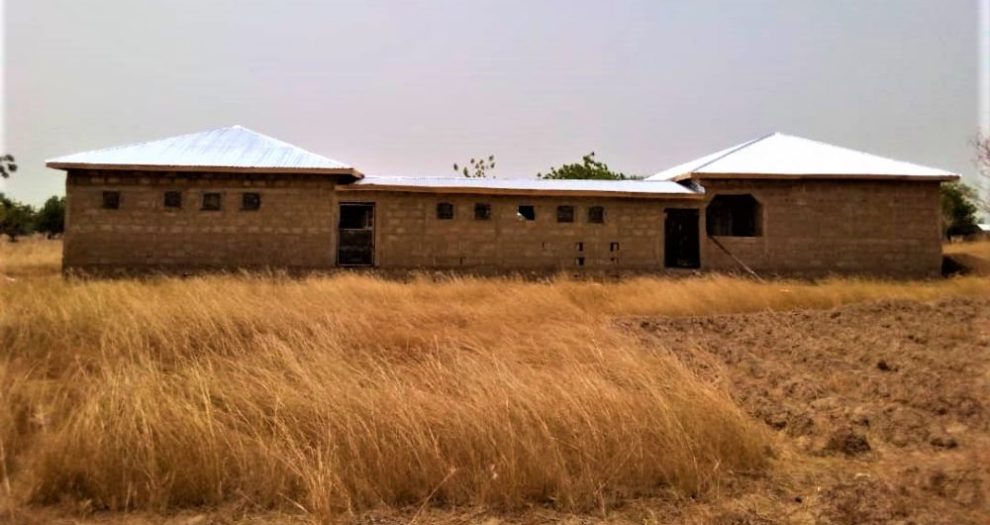
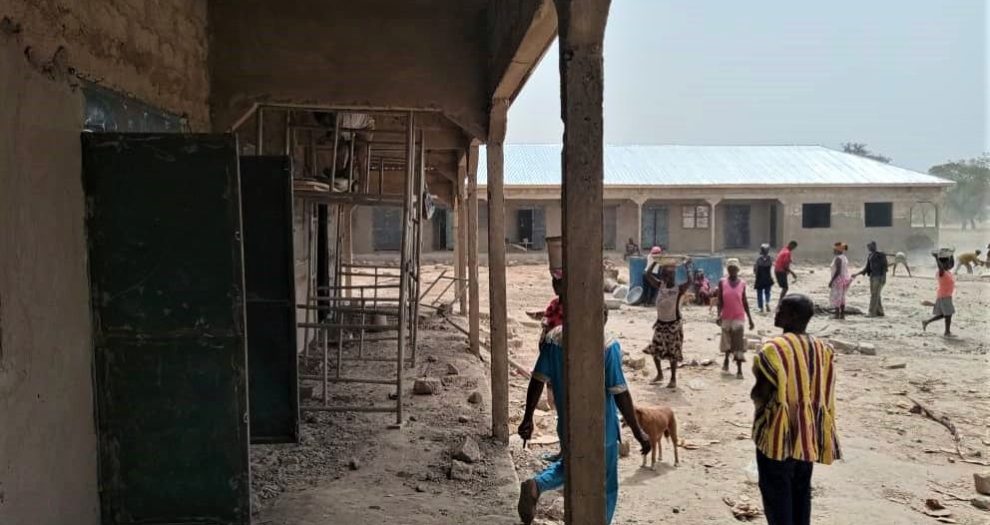
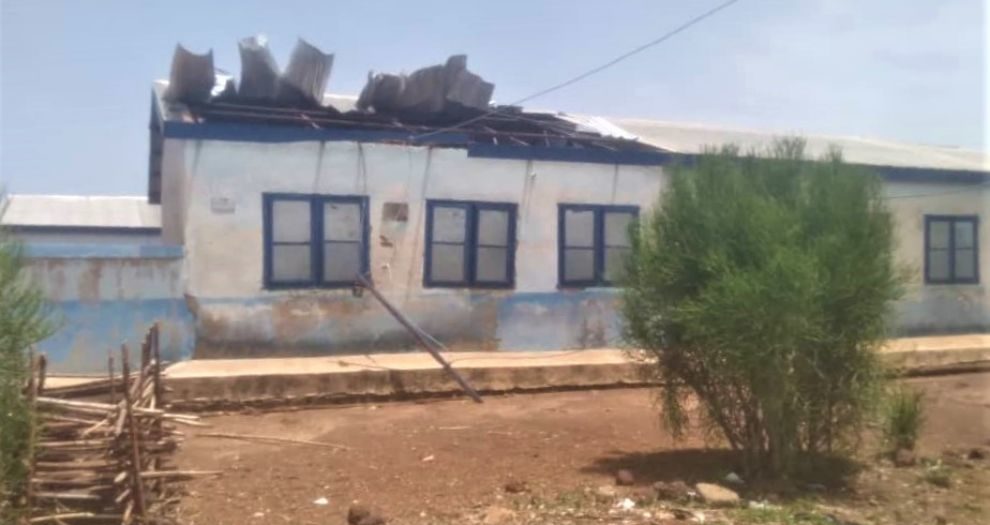
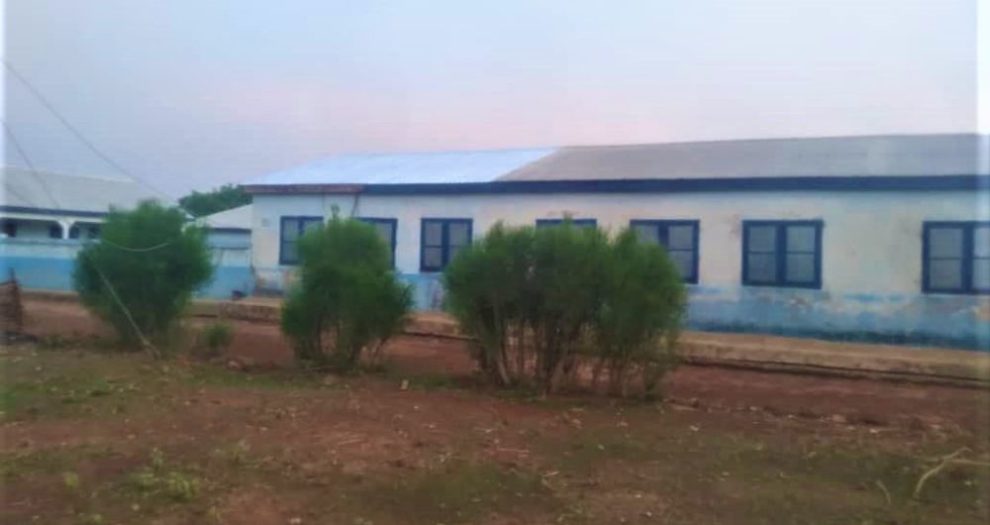
Teacher Training and Conference Centre
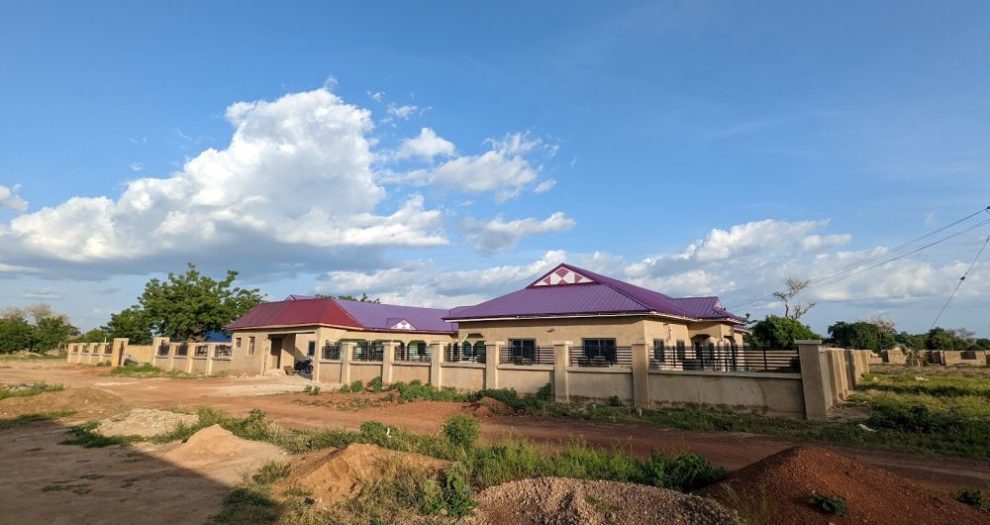
The new teacher training and conference centre is now virtually complete. The centre is in the market town of Lawra. The construction has taken place across the course of the pandemic, and it is the most complex building constructed by Savannah. We give thanks for the funding to support the new centre – drawn from a legacy and from a small number of grant-making organisations.
It is already proving to be a wonderful base for Savannah. It provides a new office for the staff team. But, most importantly, it provides a centre for the ongoing support and training of our teachers. It is tough being a teacher in a remote village school, and the centre will assist them in all elements of their work. It also provides resources which would be impossible to access anywhere else in the area, including Christian literature. Alongside the physical infrastructure, we have also been able to appoint a School Improvement Officer and are in active conversation with another NGO about various imaginative ways to keep improving the quality of education at the schools. Alongside the centre we have a small number of bedrooms which we hope will be useful for the centre, but will also be a source of income in the future (given the general lack of accommodation available in this remote area).
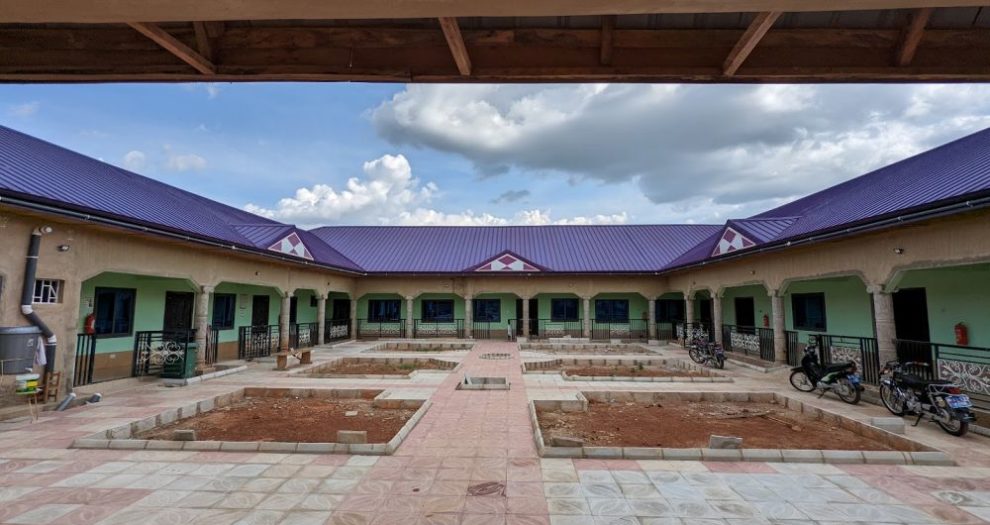
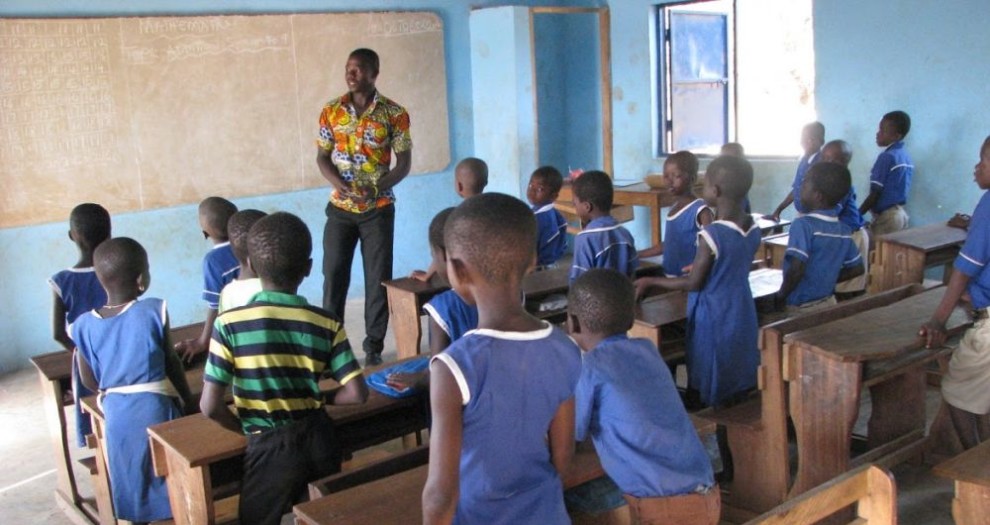
On the Road Again
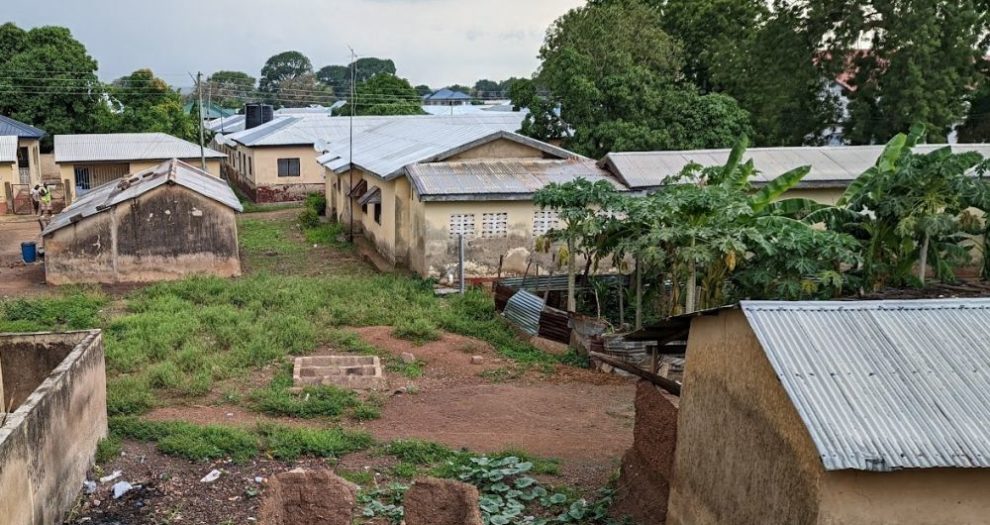
One of the challenges of the pandemic has been that travel to Ghana has been impossible. With travel now opened up we are thankful to be able to visit again – and indeed a couple of visits are taking place across the back half of 2022.
Apart from the joy of seeing the projects and our friends again, one of the striking things, as we return after a number of years, is how the whole of this area is developing. We are thankful that the work of Savannah has played its own small role in this development.
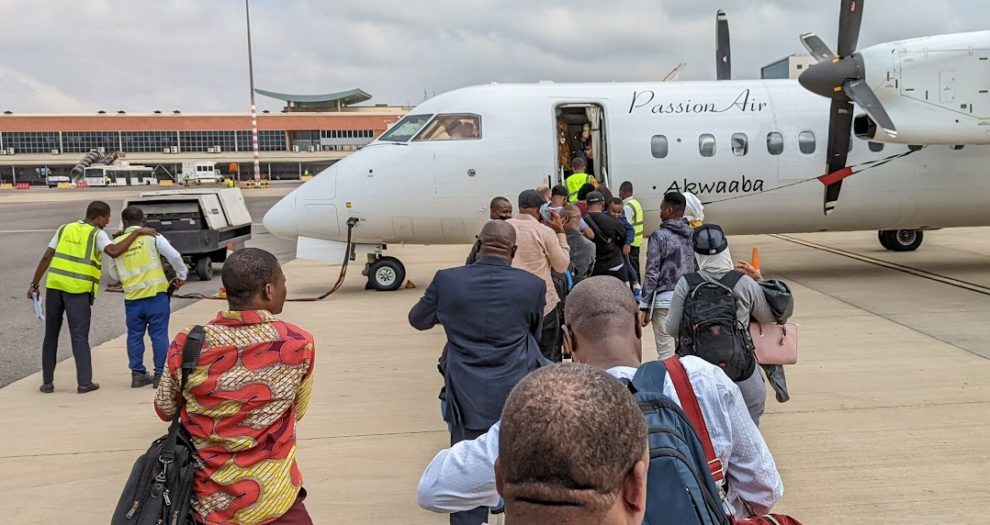
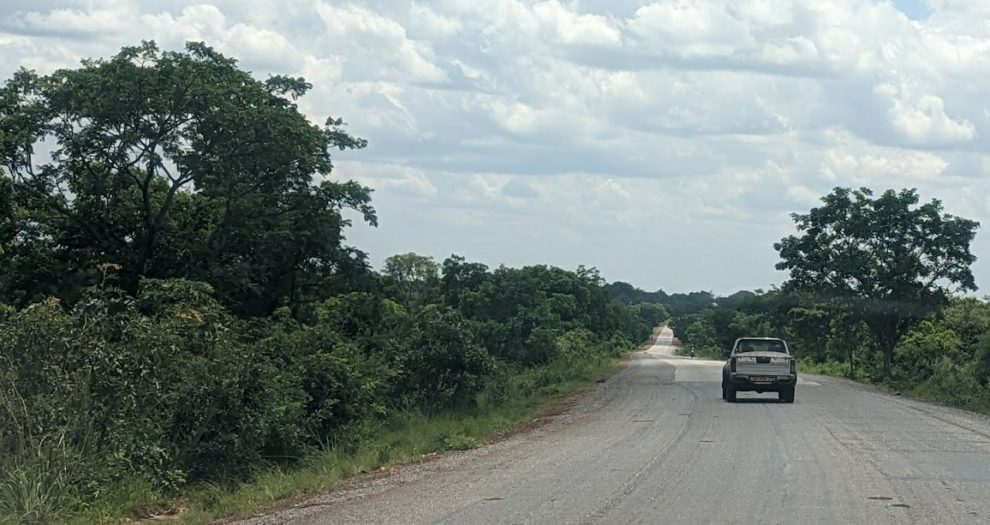
For many years we travelled to this area by driving the length of the whole country from Accra: a long, hot, dusty, difficult journey. It made for memorable experiences but meant that short visits were impossible. Recently, however, a daily flight has started from Accra to the regional capital in Wa. The small plane (generally packed with people) lands at a tiny airport just a 90-minute drive away from the schools.
Even the drive to our first school in Bagri feels different. The bumpy dirt track has been replaced by tarmac and electricity pylons now line the route into the village. The village feels less remote, and the traditional mud huts have corrugated iron roofs to better withstand the tropical rain.
Despite these welcome changes, you do not have to spend long in conversation with local people to discover the ongoing hardships. The recent rise in the cost of food has had a particularly difficult impact on lives here.
The Opening of Danko-Buree
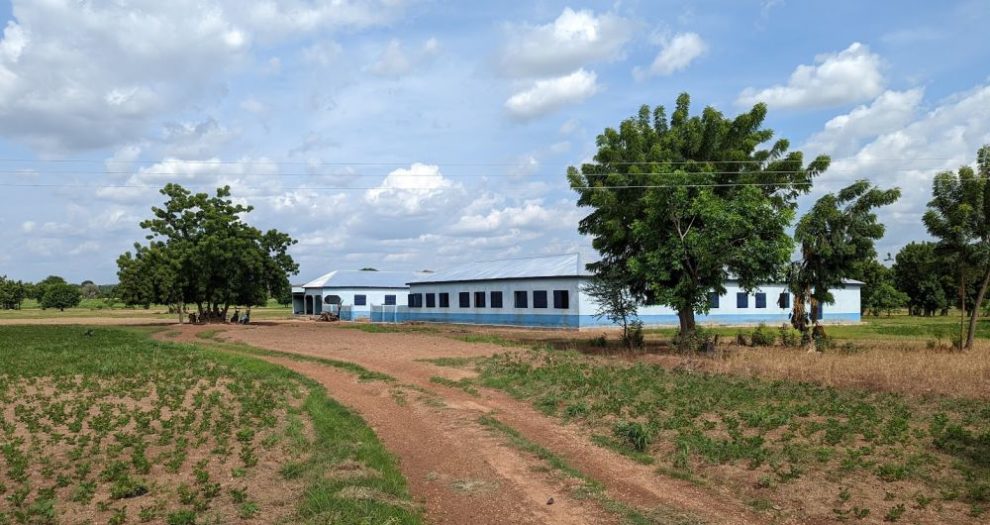
In July we were able to attend the opening (or commissioning) ceremony of our new school, set in beautiful countryside at Danko-Buree. These twinned villages are to the northeast of Lawra, along the road to Eremon. The communities had recently tried to start a fledgling school – but only had trees for shelter and untrained villagers for teachers.
On the day of the commissioning, the delight at their beautiful new blue school was evident on the faces of pupils and parents, who slowly gathered at the school site.
Villagers came from far and near and, as the temperatures began to rise, we were joined by dignitaries from Lawra Municipal Assembly and the local education office as well as the Paramount Chief of the area.
The ceremony opened with prayer. Then there were a number of speeches, and it was a moving moment to be able to address the crowd who had gathered – to acknowledge the goodness of God and the importance of a Christian education. It was also an opportunity to reflect on generous support for the school project, and to recognise the hard work of the Savannah staff team. “This school is a great tribute to your community. It is your school. You built it with your own hands. And it will provide an education for your children.”
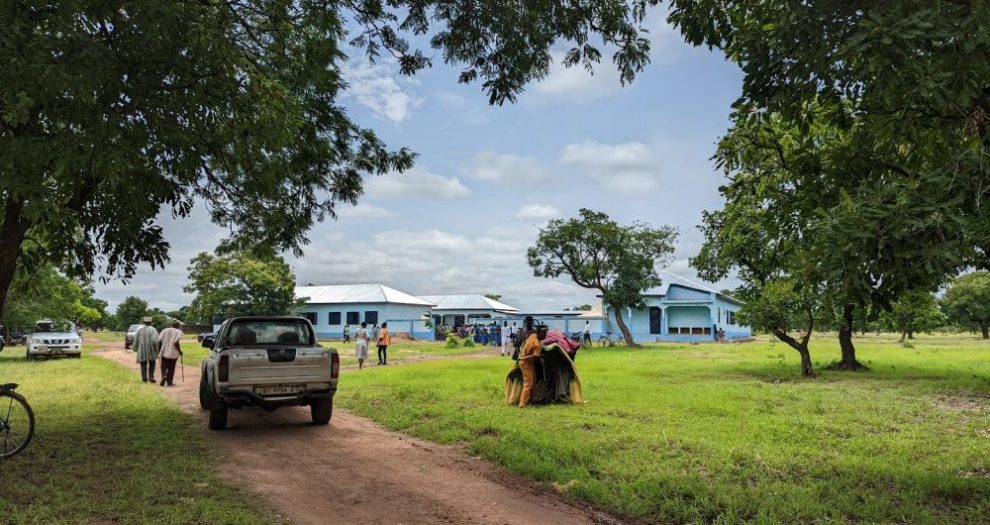
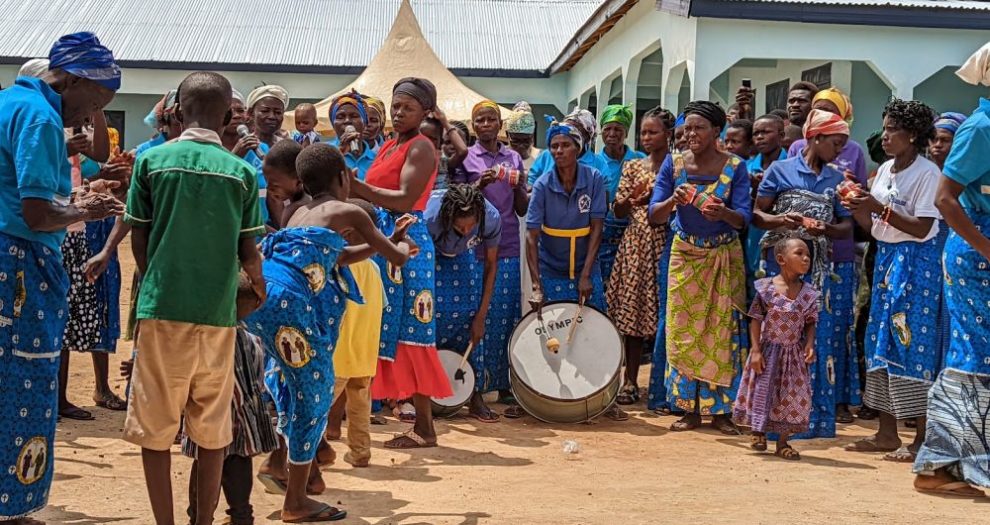
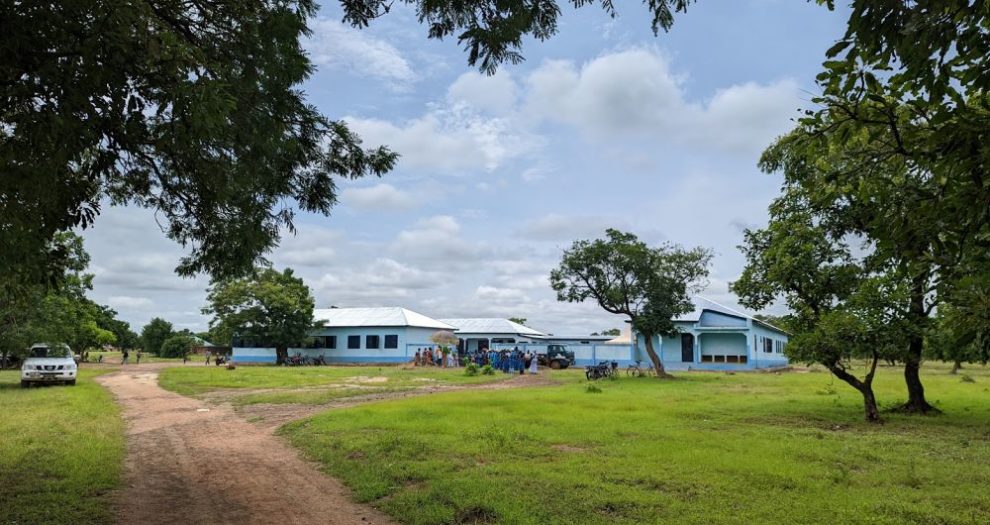
The day, however, properly belonged to the children and not the dignitaries or speech-makers. They were smartly dressed in blue uniforms: a blue dress for the girls, and beige shorts and blue shirt for the boys. Marching in through the white school gates, they sang a number of songs. At the end of the speeches and children’s performances, we were presented (amidst much noise and commotion) with tribal robes. The ribbon was cut and a plaque was unveiled.
We left the school and travelled back through deep savannah landscape to the noise of xylophones and drums sounding. The hot air still thick with the dust created by dancing feet.
Although this was the ninth such opening ceremony for one of our schools, the day will linger long in the memory. We do not take any of it for granted and remain grateful to those who made this possible. We also remain thankful on behalf of the children, parents and teachers who will enjoy the benefits and blessings of an education. The ceremony marked both the end of construction, but also a beginning: the start of the school’s life. We look forward to seeing the impact across the next generation of children.
Lives Changed
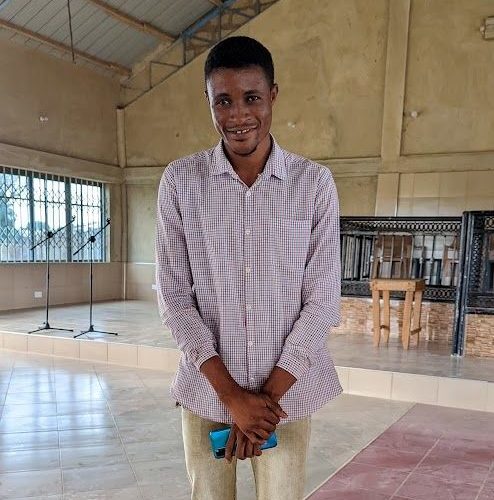 We are thankful to be able to report of buildings started or completed, of ceremonies held and visits undertaken. But the real measure of the effect of Savannah is in the lives touched by the work.
We are thankful to be able to report of buildings started or completed, of ceremonies held and visits undertaken. But the real measure of the effect of Savannah is in the lives touched by the work.
During our visit in July, we met Oliver. We had met him before. He was three when we first visited his village of Bagri. Living in a simple mud hut, neither of his parents had enjoyed any education. He was part of the third cohort of students proudly to walk to our new school in Bagri every day. Having completed his schooling, he took a plumbing course – and now works helping to run a small plumbing business in Lawra.
Different local stakeholders have different (although complementary) motivations for supporting the work. For the church, one of their prayers has long been that the schools will help build their local churches – and they recognise the importance of educated church members.
It was therefore very moving to attend Bagri Church, and to see large numbers of educated young people. This was personified by Oliver, who took the early morning Bible Study – and gave an excellent talk (and spoke in English).
Thank you
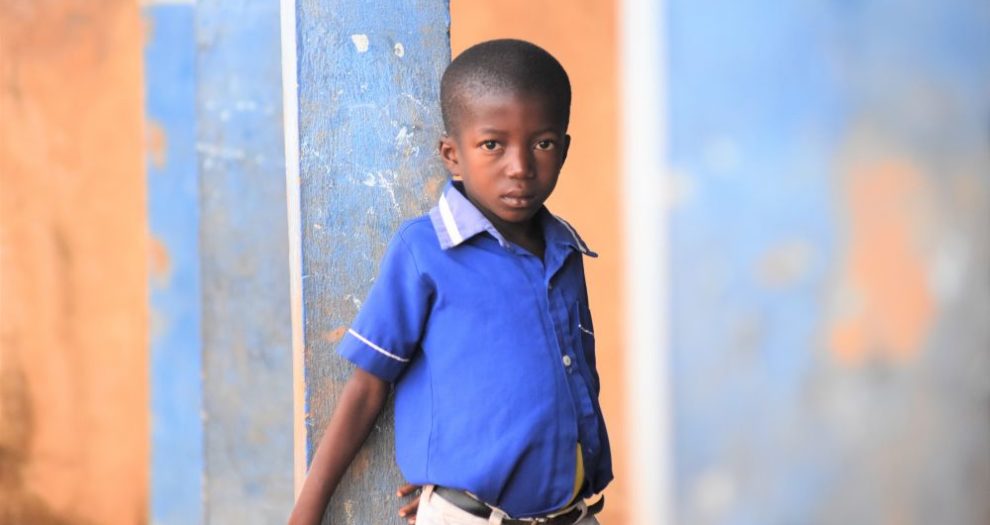
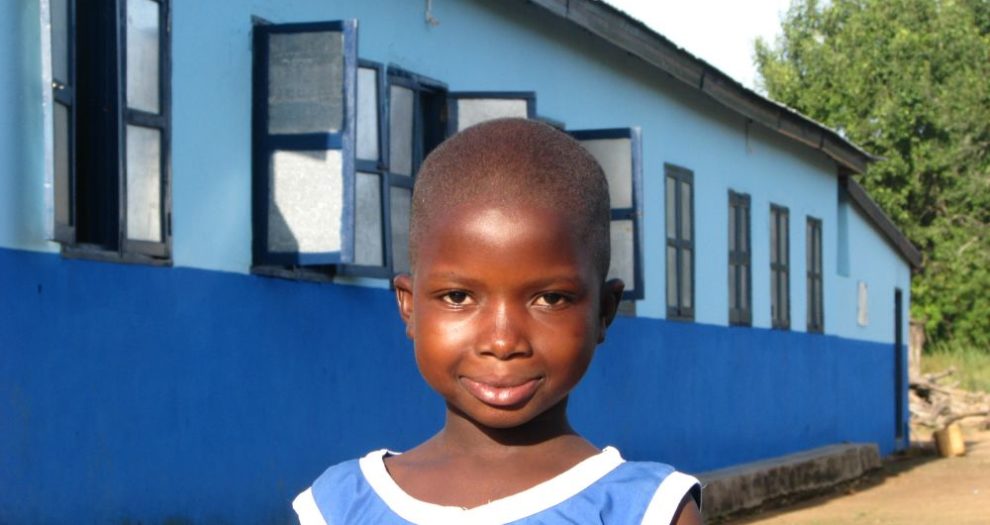
There is a lot happening across the Savannah schools. This newsletter can only share a fraction of the activities. Despite the scale of the enterprise, we have still managed to maintain a situation in the UK where we have no paid staff and no formal ‘fundraising’.
None of the work would be possible without the generous donations of our kind supporters, and we want to thank you for your ongoing direct debits, one-off contributions and legacies. This is particularly important at a time when our costs in Ghana are rising dramatically, alongside the rising prices internationally.
We thank the Lord who has built and sustained the work, and remain grateful for your prayer that we might continue to see His guidance and support.
The post Newsletter, Autumn 2022 appeared first on Savannah Education Trust.
Newsletter, December 2021 20 Dec 2021 7:25 AM (3 years ago)
Dear Supporters
We would like to introduce you to Comfort Bun-ire.
Comfort is a housewife and subsistence farmer. She lives and works in the remote village of Lyssah, in northwest Ghana – not far from the border with Burkina Faso. She is 34 years-old and lives with her husband, two sons, three daughters and her mother-in-law. Their lives rise and fall with variations in the crops and the weather. By every measure she is poor. Comfort knows scarcity, which can make ‘enough’ seem like plenty.
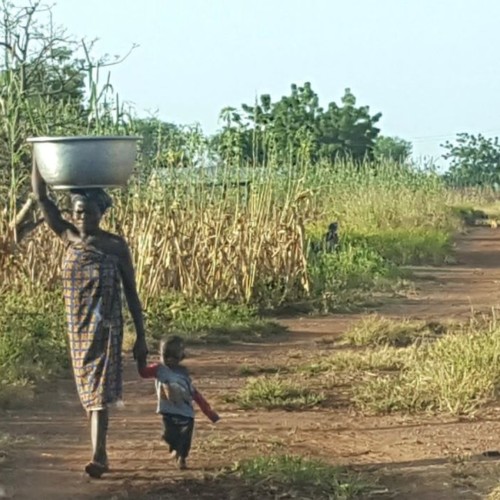
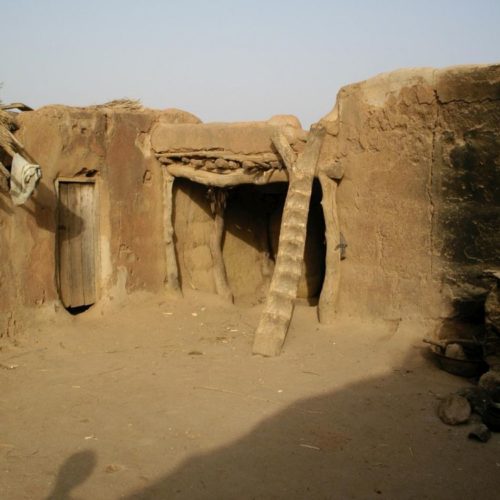
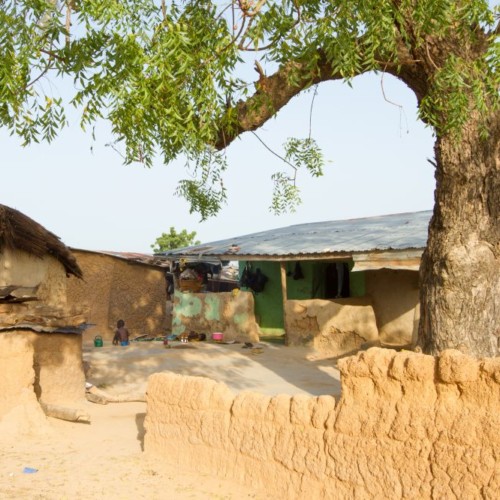
Home is a small collection of ochre huts arranged around a central courtyard. The air is heavy with heat, the din of cicadas, and the odour of smouldering charcoal. A gnarled acacia tree provides some shade from the midday sun: a scrawny dog scratches and yawns, chickens scrape in the dirt, a couple of piglets doze in the corner – tails flicking flies. A large pot simmers over a wood fire – charcoal black stains on a nearby wall evidence of this daily ritual. Simple steps carved into a log leaning against a wall gains access to the roof, where maize dries in the sun. Scattered around the compound are signs of Comfort’s tough subsistence lifestyle – fishing nets hanging from the tree, a wooden hoe, a rake.
Beneath the compound, a graveyard – the burial place of the ancestors. Their presence, marked by a mud memorial, a daily reminder of the brevity of life.
Her day begins at first light. She is busy all day with housework, pounding millet, collecting firewood, and labouring in the field. Like everyone else in the village, Comfort does not have access to tap water. She is the main person responsible for fetching water for the family. The round trip to the borehole takes about an hour, morning and evening. When she is too busy tending the crops or making TZ (Tuo Zaafi – the staple food , a sticky porridge made from millet flour), she has to send her children to collect water.
Despite owning a small parcel of land her family is not making any income from their fields. Occasionally surplus crops can be sold in the weekly market in Lawra – but it can often be a battle for survival. During this year’s rainy season, exceptionally heavy and prolonged rains flooded the area, destroying Comfort’s fledgling crops and making the food supply for next year uncertain. This has been exacerbated by the rising cost of food in the area, a result of supply issues caused by the pandemic. The current plan is for her husband and oldest child to migrate south to Kumasi in search of work until next harvest, hoping that the weather conditions will be more favourable next year. This is the harsh reality of subsistence farming – what it means to be trapped in the arduous cycle of poverty with little hope for the future.
Although Christmas means little to Comfort, this year she has received a wonderful gift! A new borehole has been drilled in her village and, close by, she watches the walls of a school building starting to rise. Comfort never had any schooling herself but, at the local market, she has heard all about the blue schools. She is overjoyed that a Christian school is being built in her village. Quite apart from the improved prospects that an education will give to her children, Comfort’s overwhelming emotion is relief. Easy access to clean drinking water and the daily provision of food for her children removes an enormous physical and emotional pressure. Real hope has arrived for Comfort and her five children. She is not able to thank you personally. But we count it our greatest privilege to do so on her behalf. There is a spiritual dimension to the work of Savannah, and our prayer is that, in due time, Comfort, her family, and many in the village will come to know another gift: what Paul calls the ‘unspeakable gift’ of the Lord Jesus.
Comfort’s children will join almost 3,000 children now attending our Christian schools in this region. During this year, pupils started attending the newest school in the village of Danko-Buree – the ninth village in which we are working (Comfort’s village of Lyssah is the tenth). None of this could be contemplated without our kind and generous supporters.
We are thankful for all the work that has happened this year, but as the responsibilities and ongoing costs increase, it is without doubt daunting too. We are ever more dependent on your prayers and your generosity.
We join with all our friends in Ghana in wishing you a very happy Christmas and God’s blessing during 2022.
On behalf of the trustees

Paul Ramsbottom
The post Newsletter, December 2021 appeared first on Savannah Education Trust.